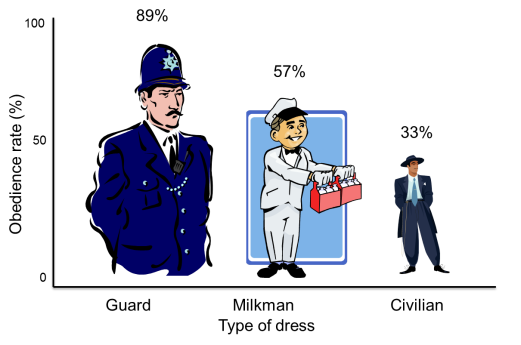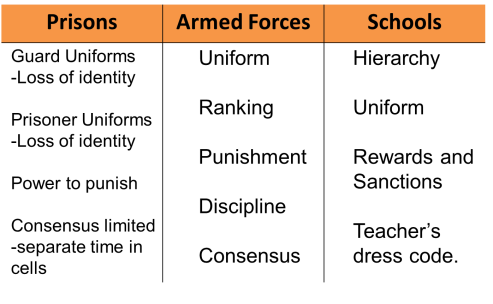Obedience
A* - G syllabus
- Created by: Thunder12
- Created on: 08-04-18 19:02
Key Concepts
Obedience: Following orders or commands from people in authority
Authority: A level of status or power
Defiance: Not following orders or commands from people in authority
Denial of responsibility: Blaming actions on a higher authority rather than accepting the blame yourself e.g. “Mum said I could”
Milgram’s research:
- aimed to see if the Nazi’s were ‘special’
- Participants were asked to give electric shocks to a ‘learner’ if they got an answer wrong
- Given prompts to continue if tried to resist orders
- 65% of people went to lethal 450 volts
- When asked why – “he told me I had to”
Core Theory
Theory of Situational Factors
- Number of variables which influence whether a person obeys or not.
- E.g. Hofling et al – doctors and nurses: 21 out of 22 nurses followed orders from an unknown doctor over the phone and gave an illegal dose of Astrofen to a patient
Setting
- Where someone is has an effect on following orders. People tend to follow the unwritten rules of how to behave in certain places (dentist, post office, worship)
Culture
- 2 types of culture individualist (all about self) and collectivist (all about the group)
Power to punish
- People obey a person in authority who has the power to threaten or punish them
Consensus
- Sheer presence and behaviour of other people that makes it impossible for us not to obey, following like ‘sheep’
Criticisms of the Core Theory
- Lacks ecological validity– it is not done in a real life setting and the participant may show ‘demand characteristics’ (doing what they think is wanted of them)- e.g. Milgram’s experiment was in a laboratory.
- Research into TSF has ethical problems – may end up causing distress, embarrassment, deception and long-term harm. In Milgram’s experiment one participant actually had a seizure from the stress, and several reported high stress levels, clenching of the fists and general upset.
- Ignores the role of the personality – suggests our behaviour is a reflex or automatic response ignoring feelings, ambition, frustration, imagination etc. Some people in collectivist cultures may not care about the group and me more concerned with their self.
- Reductionist – it only considers a small number of factors, rather than the whole picture of obedience. It ignores the role of the personality and thinking in how much we obey.
Alternative Theory
Theory of dispositional factors
Dispositional factors: factors associated with someone’s personality that makes them more likely to obey others.
Authoritarian personality: a personality type which is prone to obedience
Came shortly after the second world war by Adorno (1950):
- Someone who feels an active dislike of lower class people
- Someone who has fixed ideas of right and wrong, good and evil
- Someone who cannot deal with any uncertainty about the right way to behave
- Someone who likes to be bossed around by people in authority.
Core Study
Aim: to investigate the effect of uniform on obedience
Procedure:
- Field experiment into the effect of uniform on obedience,
- Used opportunity sampling – picked people who were available on the streets of Brooklyn at the time.
- 3 experimenters dressed as either a guard, a milkman or a civilian (normal person)
- Gave one of three instructions
- Pick up this bag for me
- This man is over parked and has no money, pay for him
- Don’t you know you have to stand on the other side of this pole, the sign says no standing
Core Study

Conclusion: how we dress can suggest authority and when people think someone has the authority to punish them, they are more likely to obey
Criticisms of the Core Study
Generalisability: Pedestrians selected via opportunity sampling – no previous knowledge about them, they might have been in a hurry or distressed. It is also culturally biased as it was only carried out in the area of New York.
Reliability: The participants could not be controlled for – we have no idea on their background or there obedience level. For example their role in their job could have affected how obedient they would be. However reliability is increased through the standardised parts of the procedure, such as the uniforms used, the questions asked and the times the experiment took place.
Application: We can use the idea of uniforms to help obedience in a number of places, such as schools, prisons and the army.
Validity: All the researchers that asked the questions were male – this could have affected the validity of the obedience rates, the gender they are could have played a part in whether they were obeyed or not. They did however use real pedestrians on the sidewalks of Brooklyn, giving the experiment high ecological validity.
Ethics: Due to the nature of the experiment, no informed consent was gained from the participants, and they had no right to withdraw. This makes the study unethical.
Applications

Related discussions on The Student Room
- Mark my essay for AQA psychology a-level social influnce (16 marker) »
- Help For AS AQA Psychology Students »
- Psychology A level 16 marker advice? »
- english lit »
- issues and debates - edexcel alevel psychology »
- Abuse »
- Milgrams variations »
- English language paper 1, Question 2. »
- Help understanding Psychology essay question »
- Is Chemistry, Physics, Maths and Further Maths a good combo? »
Comments
No comments have yet been made